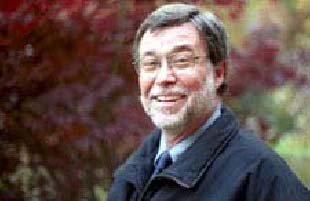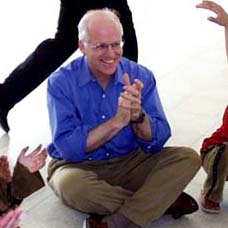2006.11.06: November 6, 2006: Headlines: Figures: COS - Sierra Leone: Anthropology: African American Issues: Native American Issues: UConn Advance: Joseph Opala has spent much of his career studying the people who became known as Black Seminoles and their language, called Gullah
Peace Corps Online:
Directory:
Sierra Leone:
Special Report: Historian and Anthropologist Sierra Leone RPCV Joseph Opala:
February 9, 2005: Index: PCOL Exclusive: RPCV Joseph Opala (Sierra Leone) :
2006.11.06: November 6, 2006: Headlines: Figures: COS - Sierra Leone: Anthropology: African American Issues: Native American Issues: UConn Advance: Joseph Opala has spent much of his career studying the people who became known as Black Seminoles and their language, called Gullah
Joseph Opala has spent much of his career studying the people who became known as Black Seminoles and their language, called Gullah

Opala described a native people whose treatment at the hands of white Europeans was shameful. Brought to the United States from Sierra Leone as slaves, a million are estimated to have died crossing the Atlantic. The Sierra Leoneans were far more resistant than the whites, and in time, the slaves began to outnumber whites. They also began to escape, Opala said, and Florida - dominated at the time by the Spanish - welcomed them. The slaves aligned with the Seminole Indians of Florida and became known as the Black Seminoles. They distinguished themselves as fierce fighters who conducted an effective guerrilla war from 1835 to 1842 against the United States Army in the wilderness of Florida. Anthropologist Joseph Opala served as a Peace Corps Volunteer in Sierra Leone.
Joseph Opala has spent much of his career studying the people who became known as Black Seminoles and their language, called Gullah
Native American land plagued by environmental damage, speaker says
by Scott Brinckerhoff - November 6, 2006
In honor of Native American Heritage Month, two guest speakers recounted Wednesday night the tribulations of the Lakota Sioux and the Black Seminoles at the hands of early United States governments.
[Excerpt]
Opala, who spent 17 years in Sierra Leone, starting as a Peace Corps volunteer in the 1970s, has spent much of his career studying the people who became known as Black Seminoles and their language, called Gullah.
Like White Face, Opala described a native people whose treatment at the hands of white Europeans was shameful.
Brought to the United States from Sierra Leone as slaves, a million are estimated to have died crossing the Atlantic.
Those who survived lived in Georgia and South Carolina and brought with them extensive knowledge of rice growing, which became a vital part of the early U.S. economy.
But the slave traders also brought new diseases with them from Africa, including malaria and yellow fever.
The Sierra Leoneans were far more resistant than the whites, and in time, the slaves began to outnumber whites.
They also began to escape, Opala said, and Florida - dominated at the time by the Spanish - welcomed them.
The slaves aligned with the Seminole Indians of Florida and became known as the Black Seminoles.
They distinguished themselves as fierce fighters who conducted an effective guerrilla war from 1835 to 1842 against the United States Army in the wilderness of Florida.
The Army had been charged with returning the Black Seminoles to bondage, since slavery was the law of the land, and the idea of having "free" slaves in Florida did not sit well with the government - even though many of these "slaves" had in fact been born free.
The Black Seminoles fought the Army to a standstill, and ultimately signed a treaty that allowed them to live in peace in Oklahoma and other locations.
In modern times, Opala has accompanied Black Seminoles from the United States to their ancestral home in Sierra Leone, where he said the U.S. contingent is always amazed to find familiar music, food, language, and culture.
When this story was posted in November 2006, this was on the front page of PCOL:





Peace Corps Online The Independent News Forum serving Returned Peace Corps Volunteers
 | Harris Wofford to speak at "PC History" series
Senator Harris Wofford will be the speaker at the 4th Annual "Peace Corps History" series on November 16 sponsored by the University of Maryland at Baltimore County (UMBC) and the Maryland Returned Volunteers. Previous speakers in the series have included Jack Vaughn (Second Director of the Peace Corps), Scott Stossel (Biographer of Sargent Shriver), and C. Payne Lucas (President Emeritus of Africare). Details on the time and location of the event are available here. |
 | Chris Dodd's Vision for the Peace Corps
Senator Chris Dodd (RPCV Dominican Republic) spoke at the ceremony for this year's Shriver Award and elaborated on issues he raised at Ron Tschetter's hearings. Dodd plans to introduce legislation that may include: setting aside a portion of Peace Corps' budget as seed money for demonstration projects and third goal activities (after adjusting the annual budget upward to accommodate the added expense), more volunteer input into Peace Corps operations, removing medical, healthcare and tax impediments that discourage older volunteers, providing more transparency in the medical screening and appeals process, a more comprehensive health safety net for recently-returned volunteers, and authorizing volunteers to accept, under certain circumstances, private donations to support their development projects. He plans to circulate draft legislation for review to members of the Peace Corps community and welcomes RPCV comments. |
 | He served with honor
One year ago, Staff Sgt. Robert J. Paul (RPCV Kenya) carried on an ongoing dialog on this website on the military and the peace corps and his role as a member of a Civil Affairs Team in Iraq and Afghanistan. We have just received a report that Sargeant Paul has been killed by a car bomb in Kabul. Words cannot express our feeling of loss for this tremendous injury to the entire RPCV community. Most of us didn't know him personally but we knew him from his words. Our thoughts go out to his family and friends. He was one of ours and he served with honor. |
 | Chris Shays Shifts to Favor an Iraq Timetable
In a policy shift, RPCV Congressman Chris Shays, long a staunch advocate of the Bush administration's position in Iraq, is now proposing a timetable for a withdrawal of American troops. How Mr. Shays came to this change of heart is, he says, a matter of a newfound substantive belief that Iraqis need to be prodded into taking greater control of their own destiny under the country’s newly formed government. As Chairman of the House Government Reform subcommittee on national security, he plans to draft a timetable for a phased withdrawal and then push for its adoption. A conscientious objector during the Vietnam War who said that if drafted he would not serve, Chris Shays has made 14 trips to Iraq and was the first Congressman to enter the country after the war - against the wishes of the Department of Defense. |
 | Peace Corps' Screening and Medical Clearance
The purpose of Peace Corps' screening and medical clearance process is to ensure safe accommodation for applicants and minimize undue risk exposure for volunteers to allow PCVS to complete their service without compromising their entry health status. To further these goals, PCOL has obtained a copy of the Peace Corps Screening Guidelines Manual through the Freedom of Information Act (FOIA) and has posted it in the "Peace Corps Library." Applicants and Medical Professionals (especially those who have already served as volunteers) are urged to review the guidelines and leave their comments and suggestions. Then read the story of one RPCV's journey through medical screening and his suggestions for changes to the process. |
 | The Peace Corps is "fashionable" again
The LA Times says that "the Peace Corps is booming again and "It's hard to know exactly what's behind the resurgence." PCOL Comment: Since the founding of the Peace Corps 45 years ago, Americans have answered Kennedy's call: "Ask not what your country can do for you--ask what you can do for your country. My fellow citizens of the world: ask not what America will do for you, but what together we can do for the freedom of man." Over 182,000 have served. Another 200,000 have applied and been unable to serve because of lack of Congressional funding. The Peace Corps has never gone out of fashion. It's Congress that hasn't been keeping pace. |
 | PCOL readership increases 100%
Monthly readership on "Peace Corps Online" has increased in the past twelve months to 350,000 visitors - over eleven thousand every day - a 100% increase since this time last year. Thanks again, RPCVs and Friends of the Peace Corps, for making PCOL your source of information for the Peace Corps community. And thanks for supporting the Peace Corps Library and History of the Peace Corps. Stay tuned, the best is yet to come. |
 | History of the Peace Corps
PCOL is proud to announce that Phase One of the "History of the Peace Corps" is now available online. This installment includes over 5,000 pages of primary source documents from the archives of the Peace Corps including every issue of "Peace Corps News," "Peace Corps Times," "Peace Corps Volunteer," "Action Update," and every annual report of the Peace Corps to Congress since 1961. "Ask Not" is an ongoing project. Read how you can help. |
Read the stories and leave your comments.

Some postings on Peace Corps Online are provided to the individual members of this group without permission of the copyright owner for the non-profit purposes of criticism, comment, education, scholarship, and research under the "Fair Use" provisions of U.S. Government copyright laws and they may not be distributed further without permission of the copyright owner. Peace Corps Online does not vouch for the accuracy of the content of the postings, which is the sole responsibility of the copyright holder.
Story Source: UConn Advance
This story has been posted in the following forums: : Headlines; Figures; COS - Sierra Leone; Anthropology; African American Issues; Native American Issues
PCOL35066
31



















